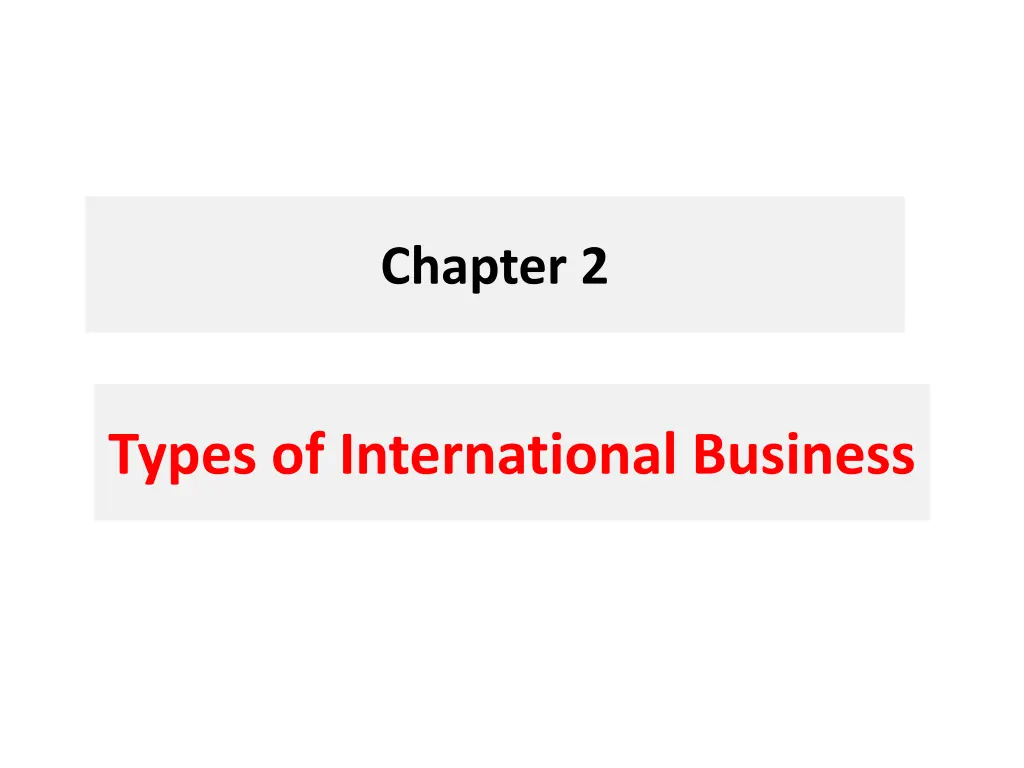
Understanding Types of International Business Strategies
Learn about the various types of international business strategies, including export-import trade, foreign direct investment, franchising, and management contracts. Explore how governments impose controls such as tariffs and non-tariff barriers in international trade.
Download Presentation

Please find below an Image/Link to download the presentation.
The content on the website is provided AS IS for your information and personal use only. It may not be sold, licensed, or shared on other websites without obtaining consent from the author. If you encounter any issues during the download, it is possible that the publisher has removed the file from their server.
You are allowed to download the files provided on this website for personal or commercial use, subject to the condition that they are used lawfully. All files are the property of their respective owners.
The content on the website is provided AS IS for your information and personal use only. It may not be sold, licensed, or shared on other websites without obtaining consent from the author.
E N D
Presentation Transcript
Chapter 2 Types of International Business
Introduction HOW DO FIRMS GO INTER NATIONAL? Foreign market entry strategies vary in degree of risk they present, the control and commitment of resources they require and the return on investment they promise. The firm can sell a physical product abroad, i.e., can export. A firm can locate a production facility abroad, i.e., engage in foreign direct investment. There's a range of forms of international business that can allow a firm to get international returns on its unique advantages.
Types of International Business Turn-key Projects Export-import trade Types of International Business Foreign direct investment Franchising Management contracts 3
1. Export-import trade What is International trade? is the exchange of goods and services between countries. This type of trade gives growth to a world economy, in which prices, or supply and demand affect and are affected by global events.
1. Export-import trade 1. Exporting : Shipment of goods or services out of the port of a country , to a foreign buyer. 2. Importing : Process of buying goods from a foreign supplier and entering them into the customs territory of a different country.
Government controls over international trade Restrictions on imports generally take two forms: tariffs and quantitative restrictions (Quota). 1. Tariffs: Import taxes imposed on goods entering the customs zone of a nation. Tariffs restrict or discourage imports by making imported goods more expensive than domestic goods. Tariffs vary widely from country to country and from product to product within countries.
Government controls over international trade Why do governments impose tariffs? Tariffs provide a significant source of government revenues. Protection of domestic industry. Political reasons: Countries wishing to punish or influence the behavior of another country for human rights violations, for example, will sometimes restrict imports from misbehaving country.
Government controls over international trade 2. Non-tariff Barriers: All barriers to importing or exporting other than tariffs ,ex. Quota. Quota: restriction imposed by law on the numbers or quantities of goods or of a particular type of good.
2. Foreign Direct Investment Foreign direct investment (FDI) happens when a firm invests directly in facilities in a foreign country. A firm that engages in FDI becomes a multinational enterprise (MNE) Multinational = more than one country Factors which influence FDI are related to factors that stimulate trade across national borders.
Foreign Direct Investment Involves ownership of unit abroad for: production Marketing/service R&D Raw materials or other resource access Parent has direct managerial control. The degree of direct managerial control depends on the extent of ownership of the foreign entity and on other contractual terms of the FDI No managerial involvement = portfolio investment .
Forms of FDI FDI forms: 1. Purchase of existing assets: Quick entry, local market know-how, local financing may be possible, eliminate competitor, buying problems. 2. New investment : No local entity exists or is available for sale, local financial incentives may encourage, no inherited problems, long lead time to generation of sales or other desired outcome. 3. Participation in an international joint-venture: Shared ownership with local and/or other non-local partner.
3. Franchising Franchising: Franchising is a form of business in which a firm that already has a successful product or service (franchisor) licenses its trademark and method of doing business to another business or individual (franchisee) in exchange for a franchise fee and an ongoing regular payments.
FranchisorFranchisee relationship Regulated by contract which usually covers: Initial fee. Royalty fee/Management fee. Capital required from franchisee. Area of operation. Duration of license and renewal Termination (End).
4. Management contracts A management contract is an arrangement under which operational functions of a company is assigned by contract to another company which performs the necessary managerial functions in return for a fee. Management contracts involve not just selling a method of doing things but involve actually doing them. A management contract can involve a wide range of functions, such as management of personnel, accounting, marketing services and training.
5. Turn-key Projects Turn-key project : is a type of project that is constructed by a developer and sold or turned over to a buyer in a ready-to-use condition. Contractor agrees to handle every detail of project for the foreign client. Turnkey projects are also used in government owned housing projects; an outside developer does all the work to build the housing units, and furnishing them with appliances. They then turned over to the government.
6. Contract Manufacturing Contract Manufacturing: A firm producing goods under the brand name of a different firm. In the computer and electronics fields, thousands of products are manufactured by contract manufacturers. These products are ordered by and branded with the OEM's "original design manufacturer name, which sells them to its customers.
